
So far in this series, we’ve explored the concepts of critical thinking and a hindrance to it, cognitive biases.
In this article, we will discuss a second hindrance: “logical fallacies.”
What is a Logical Fallacy?
Again, let’s define some terms:
- logic
- reasoning conducted or assessed according to strict principles of validity
- fallacy
- a mistaken belief, especially one based on unsound argument; a failure in reasoning which renders an argument invalid
So putting them together, we arrive at this:
a mistaken belief, especially one based upon unsound argument, caused by a failure to accurately assess reality.
Accordingly, such arguments and their conclusions should always be regarded as invalid. The use of logical fallacies as rhetorical devices are one of the primary tools of propagandists to exploit biases, both real and imaginary, within their hearers.
Capturing Christianity’s excellent webpage containing a glossary of apologetics terms defines it thusly:
An argument is fallacious when it makes “wrong moves” either in logic or reasoning. Fallacies can be formal or informal. A formal fallacy is a flaw in logical structure, such as when a conclusion doesn’t logically follow from the previous steps or premises. An informal fallacy is a flaw in reasoning, such as when one generalizes from too small a sample size.
Lets establish a few more definitions:
- formal fallacy
- a pattern of reasoning rendered invalid by a flaw in its logical structure. The argument itself could have true premises, but still have a false conclusion. Thus, a formal fallacy is a one where deduction goes wrong, and is no longer a logical process.
- informal fallacy
- mistakes in reasoning arising from the mishandling of the content of the premises themselves as opposed to a flaw in the logic itself
- premise
- an assumption that something is true
- conclusion
- describes the relationship between two or more premises. Any conclusion is the consequence of its premises
- consequence
- a result or effect of an action or condition
Here are examples of formal and informal fallacies to help you grasp the concept:
- Formal: If it’s a dog, then it’s a mammal. Therefore, if it’s not a dog, it’s not a mammal.
- Formal: We must do something. This is something. Therefore, we must do this. (aka the politician’s fallacy)
- Informal: There is evil in the world, therefore God is evil.
- Informal: All left-handed people are bullies because a left-handed person bullied me as a child. (aka the Anecdotal Evidence fallacy)
The following is a non-exhaustive list of the most common logical fallacies and how they are used in political and, sadly, certain theological debates.
A List of Prevalent Logical Fallacies
Straw Man & Ad Hominem Attacks
These are among the most prevalent fallacies in modern political and theological debate. Though they are 2 distinct fallacies, I have combined them here because those presenting them almost always wield them in tandem. Folks employing them tend to think this combo is some kind of invincible 1-2 knockout punch immunizing them from counter-attack, but they are sadly deceived. Tragically, few of their opponents have the reasoning skills necessary to defend against them — which is exactly what those posing such attacks are counting on.
Attacking the Straw Man
The simplest definition of a straw man attack is misrepresenting an opponent’s position to make it easier to attack. In other words, someone distorts or outright falsifies their opponents’ narrative on an issue, sometimes so badly that distorted/falsified view bears little — if any! — resemblance to the actual one being attacked, then attacks their own distortion. This fallacy is so wide-spread out there that if straw-man attacks were rowboats lashed together, you could probably hike across the Atlantic Ocean on them, if you will pardon my hyperbole here!
Ad Hominem
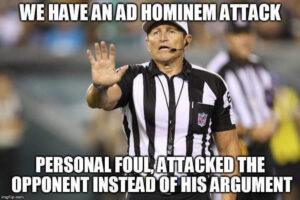 This term literally means “to the person” in Latin and is defined as attacking an opponent’s character, motives, or personal traits in an attempt to undermine their position in lieu of providing valid and reasonable arguments against it. Here’s an example:
This term literally means “to the person” in Latin and is defined as attacking an opponent’s character, motives, or personal traits in an attempt to undermine their position in lieu of providing valid and reasonable arguments against it. Here’s an example:
After June presented an eloquent and compelling case for a more equitable tax system, Tom shouts out from the audience, “Why should we believe anything presented by a woman who eats her own boogers?”
Demonizing the Opposition
The most commonly used variant of ad hominem is called “demonizing the opposition.” This is simply the practice of portraying your opponent as inherently evil and/or having evil ulterior motives simply because they hold the opposing position in any given debate.
We see this in use constantly through the daily name-calling (racist, homophobe, Islamaphobe, etc.) by the left against political conservatives and the “heretic” label so casually bandied about within the Body of Christ against those who have the temerity to believe the Bible a bit differently than they do. We also see this fallacy evidenced far more subtly in the virtue signaling pervasive within pop culture (I’m a really good person/company/cause because I support this or that and oppose those bad people who don’t).
Boogie-Man Fallacy
Another ad hominem variant is called “the Boogie-Man Fallacy.” Like all flavors of this kind of attack, the goal is to discredit and marginalize opponents and their views rather than objectively evaluating and offering a sound, non-fallacious rebuttal. This is a means of forestalling discussion and erroneously labelling an opponent’s position with that of a known moral flaw or heresy so as to demonize and discredit it.
For example, someone in a debate might say, “Look! His view sounds like something Hilter said once, so you shouldn’t listen to him any more.” Hitler is a known “boogie man” or “bad character,” so if I can associate my opponent’s views with Hilter, then I’ll discredit him all together. Sound like many comments from the left concerning President Trump? You bet!
In the cultural and political sphere, we see this straw-man/ad hominem pair employed constantly in attacks against political conservatives. The leftist mantras of “white supremacy” and “racist” are constantly being attached to those who resist Marxism, both without a shred of real evidence to support whether such a bias actually exists. My assertion here does not imply white supremacists do not exist or there are no racial issues needing to be resolved — such a statement would be equally fallacious in its own right! But not every conservative or even a majority of them fit those monikers. Just the fact I personally exist on this planet disproves such a blanket generalization because I’m neither a white supremacist nor a racist, yet I’m a dyed-in-the-wool political conservative and will be until I depart this planet (after I die, though, I’ll probably end up voting Democrat! 😎)
Within Christendom, we see these fallacies most evident in attacks by anti-charismatics against both charismatics/Pentecostals and the Word of Faith (WoF) movement. For example, in my repeated encounters with theological opponents over these topics, I have yet to discover a vocal critic of the so-called “health & wealth gospel” — some of them internationally renowned theologians, I might add! — who can accurately articulate what we actually teach, much less refute it using proper hermeneutical standards. In every such case, that person has erected a “straw man” with little or no relationship to the truth, claimed we believe that, and then demonized us as evil heretics deserving of hellfire for teaching such (the links in this paragraph provide actual instances of this along with my refutations, so I’m absolutely not making any of this up!). And there are a host of other logical fallacies tagging along behind them, as well.
Appeal to Emotion
This is yet another one endemic to public debate these days. This fallacy occurs when an emotional response is used in place of a valid and compelling argument. The most frequently occurring instances of this are what we commonly call “guilt-trips.” I can guarantee just about every adult has heard the example I’m about to use here:
Shawn didn’t want to eat his sheep’s brains with chopped liver and Brussels sprouts, but his mother told him to think about all the starving children in Third World countries who had nothing to eat at all, so he should eat them and be grateful.
Ad Ridiculum (Appeal to Ridicule)
This occurs when someone claims their opponents’ argument is ridiculous or absurd. One example would be:
“Why should I support the 2nd Amendment? Do I look like some toothless, uneducated hillbilly?”
This is a frequent form of attack used by atheists and leftists to attack Christians. It is also an underlying attitude exhibited by many anti-charismatics towards Pentecostals, a Christianized version of what we Southerners call, “Yankee snootiness.” Tragically, many charismatics and Pentecostals have brought this upon themselves by exhibiting some terrible biblical scholarship at times when attempting to explain/teach their powerful experiences with the Holy Spirit and His gifts.
Ad Verecundiam (Appeal to Authority)
This occurs whenever someone presents an argument based upon the opinion or position of a person or institution of authority in lieu of a valid argument.
This fallacy can lead to a flavor of groupthink where its membership is based upon “all the best minds accept this” or “all forward-thinking people believe this,” thereby implying their opponents are less intellectually capable than the group’s members.
 We see this one all the time these days in pop culture’s narratives concerning man-made climate change and COVID-19 policies expressed as “Go with the science!” as if science has the be-all, end-all final word on either highly controversial issue.
We see this one all the time these days in pop culture’s narratives concerning man-made climate change and COVID-19 policies expressed as “Go with the science!” as if science has the be-all, end-all final word on either highly controversial issue.
Science is a discoverer of physical reality, not the determiner of it. Neither is it any kind of authority over things eternal or spiritual. In other words, science cannot empirically prove or disprove anything originating outside this physical realm, such as the existence of God or His miracles. We can say this because the original premise upon which all science was founded was “God is a God of reason, therefore His creation can be discovered and manipulated through reason.”
Go back in time, whether measured in millennia, centuries, or mere decades, and you will find science’s path strewn with the carcasses of now-discredited theories the vast majority of scientists considered absolutely factual in their own time, but were later discovered to be totally bogus. For examples:
- It was the received wisdom for millennia that the sun revolved around the earth until the opposite was proven.
- For centuries before germ theory was proven to be factual, sickness was thought to be caused by “bad humors” and the now-considered idiotic practice of blood-letting was performed to “let them out.”
- Throughout the 18th and 19th centuries, the prevalent “science” was a silly belief that Caucasians were inherently superior intellectually to non-whites.
We also see this fallacy in action whenever folks opposing charismata and the WoF cite John Calvin and other long-dead theologians as if their writings came down off Mount Sinai on tablets of stone written by the finger of God despite what the Scriptures clearly state. The faulty underlying assumption there is “the older the source, the more irrefutable it is.”
Ad Antiquitatem (Appeal to Tradition)
This fallacy relies on tradition to prove a point, arguing that a thesis must be correct because it has traditionally been so (we’ve always done it this way!).
We also see this one all the time when discussing with charismatic theology with anti-charismatics, usually in conjunction with an Appeal to Authority.
Ad Metum (Appeal to Fear aka Scare Tactics)
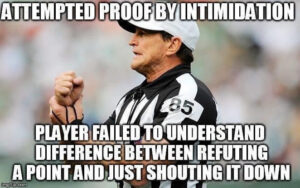 This fallacy ranges in application from pandering to the fears of listeners to outright threats against those listeners in order to gain their compliance.
This fallacy ranges in application from pandering to the fears of listeners to outright threats against those listeners in order to gain their compliance.
We saw this fallacy in action when members of the racial grievance industrial complex both doxxed (revealed the names and addresses of) the jurors for the Derek Chauvin trial and made public calls for violent revenge upon those jurors if they failed to convict him. Rightfully fearing for their own and their families’ lives; those poor jurors complied and convicted him on all counts despite there being a reasonable-doubt hole in the prosecution’s arguments big enough to drive a truck through.
Appeal to Nature
This fallacy makes its appearance in every single debate over homosexuality in the marketplace of ideas since that became a hot-button topic. This fallacy claims that simply because something is “natural,” it is therefore valid, justified, inevitable, good, and/or ideal. So the gay narrative is that simply because someone feels an attraction to those of the same gender, having sex with them in defiance of divine command must be morally correct and legally justifiable. Tragically, this fallacy is now enshrined as government policy nationwide. I’ve already weighed in on this debate elsewhere here at Miscellaneous Ramblings, so feel free to peruse that article at your leisure.
The sticking point in this fallacy occurs when you take it to its absurd logical end (reductio ad absurdum): there are times when folks are angry enough to murder someone. This is only natural, therefore a choice to follow through with that desire is morally correct and legally justifiable. To which we rightly say, “Nonsense!” or perhaps a stronger term of disgust. Tragically, we see this very argument presented in public discourse over alleged systemic racism by police and is trotted out as a justification for assassinating officers.
Ambiguity
Remember earlier in this article I mentioned how imprecise definitions are a prime tool of propagandists? This fallacy is that principle in action. This one uses double-meanings or ambiguities of language to mislead or misrepresent the truth. For example:
When the judge asked the defendant why he hadn’t paid his parking fines, he responded that he shouldn’t have to pay them because the sign said, “FINE FOR PARKING HERE” so he naturally presumed it would be fine to park there.
This is why it is supremely important to ensure you and your opponent are actually talking about the same thing because if he claims one thing and you answer using a definition you had assumed, but he didn’t mean, you have been enticed into a trap. The counter for this fallacy is quite easy: keep asking questions!
- What do you mean by that? and variants thereof until you have a clear understanding of what he meant.
- Then ask, “How did you come to that conclusion?” and keep asking variants of that question until it is thoroughly answered.
Then — and only then! — you can assert your truth claim to accurately refute it, preferably presenting that claim as a loaded question (see below). This is a process which takes time and patience, so don’t get in a hurry and short-circuit the process. Your patience will be rewarded!
The Loaded Question
A loaded question (known in the legal profession as “leading the witness”) is a common debate tactic which can be employed either by or against you. A leading question is one containing a built-in assumption so the question cannot be answered without appearing guilty.
Here’s a couple of examples:
How long has it been since you stopped beating your wife?
Betty and Louise were both romantically interested in Gary. Once day, with Gary within earshot, Betty asks Louise in an inquisitive tone whether Louise’s fungal infection had cleared up.
When a leading question is used against you, as in the examples just cited, you should always respond with another question, “What could have possibly given you such a mistaken impression?” or in these specific examples: “What led you to the faulty assumption I have ever beaten my wife?” or “What led you to the faulty assumption I have a fungal infection?”
The secret to successfully opposing such attacks — as well as cementing your credibility in the perceptions of the attacker and bystanders alike — is to REMAIN CALM and answer dispassionately (“the facts, ma’am, nothing but the facts”). Once you exhibit any degree of indignation, anything you say in response will be immediately suspect and exposed to a Personal Incredulity attack (see below).
On the other hand, when wielded skillfully in dealing with political and theological opponents, loaded questions can really score some points in getting your opponent to think outside the box of their biases, preconceptions, and assumptions. After using probing questions to remove ambiguities in their claims, a leading question can be the coup-de-grace exposing their fallacious thought processes. In such cases, however, we are not using our own assumptions to frame leading questions, but the underlying assumptions presented by those we are dealing with.
Here’s an excellent example of using these kinds of leading questions. The internationally renowned Christian apologist Greg Koukl, author of the excellent book Tactics (which I heartily recommend!), recounts a story where he discussed abortion with a Wiccan clerk at a store in Wisconsin (I have edited the following quote and limited it to the conversation itself. Ellipses between paragraphs denote wherever I did this. You really should buy this book and read the entire passage to hear his analysis and superb instruction as the story progresses):
“Does that pentagram have religious significance,” I asked, pointing to the pendant, “or is it just jewelry?”
“Yes, it has religious significance,” she answered. “The five points stand for earth, wind, fire, water, and spirit.” Then she added, “I’m a pagan.”
…
“So you’re Wiccan?” I continued.She nodded. Yes, she was a witch. “It’s an earth religion,” the woman explained, “like the Native Americans. We respect all life.”
“If you respect all life,” I ventured, “then I suppose you’re pro-life on the abortion issue.”
She shook her head. “No, actually I’m not. I’m pro-choice.”
I was surprised. “Isn’t that an unusual position for someone in Wicca to take — I mean, since you’re committed to respecting all life?”
“You’re right. It is odd,” she admitted. Then she qualified herself. “I know I could never do that,” she said, referring to abortion. “I could never kill a baby. I wouldn’t do anything to hurt someone else, because it might come back on me.”
…
“Well, maybe you wouldn’t do anything to hurt a baby, but other people would,” I countered calmly. “Shouldn’t we do something to stop them from killing babies?”“I think women should have a choice,” she responded quickly, without thinking.
…“Do you mean women should have the choice to kill their own babies?”
“Well…” She thought for a moment. “I think all things should be taken into consideration on this question.”
“Okay, tell me: what kind of considerations would make it alright to kill a baby?”
“Incest,” she answered.
…
“Hmmm… Let me see if I understand your view,” I said. “Let’s just say I had a two-year-old child standing next to me who had been conceived as a result of incest. On your view, it seems, I should have the liberty to kill her. Is that right?”
…
Finally, she said, “I’d have mixed feelings about that.”“I hope so,” was all I had the heart to say.
(at that point, he had to end the conversation because of the growing line of customers forming behind him)
Koukl, Gregory. Tactics, 10th Anniversary Edition (pp. 26-29). Zondervan.
Burden of Proof
 This is another favorite in the rhetorical toolboxes of atheists, skeptics, and political liberals. How this fallacy works is someone makes a truth claim, then tries to shift the burden of proof that their claim is untrue to the one opposing it. In apologetics, this is typically expressed by atheists as, “There is no God. Prove to me there is one!” Tragically, Christians fall into this very trap with depressing regularity.
This is another favorite in the rhetorical toolboxes of atheists, skeptics, and political liberals. How this fallacy works is someone makes a truth claim, then tries to shift the burden of proof that their claim is untrue to the one opposing it. In apologetics, this is typically expressed by atheists as, “There is no God. Prove to me there is one!” Tragically, Christians fall into this very trap with depressing regularity.
Here is the rule we all need to keep in the forefront of our thinking during such encounters:
Whoever makes the truth claim is solely responsible for proving it.
Those failing to remember this will always lose the argument every time because you have allowed your opponent to seize and hold the high ground in the debate.
Instead, respond by deflecting that attempt and put it back on the claimant using questions as I discussed above under the Ambiguity Fallacy. When you repeatedly say, “What do you mean by that?” until you get a specific definition to their claim and then “How did you come to that conclusion?” you are placing the burden of proof squarely back where it belongs.
Incomplete Comparison
An incomplete comparison occurs when two things are compared which are not really related, in order to make one of them more appealing than it is. This also happens when conclusions are drawn from incomplete information. One example is:
Carrots have much less sugar than a gallon of chocolate syrup.
The Furtive Fallacy
Furtive fallacy happens when certain events appear to have been caused by the evil deeds/motives of the decision makers involved. This fallacy occurs most often when historians or scientists write lengthy articles describing certain persons or events and present insufficient evidence to prove their claims. The argument being made is not only lacking foundation, it is made with absolute certainty to further an agenda.
We see this one frequently in apologetics circles in the ubiquitous claim by skeptics that the Council of Nicæa in 300 AD or so kept certain books out of the canon of Scriptures because they contradicted the Catholic Church’s narrative. This fails on 2 tests:
- The Catholic Church as we know it today did not exist in 300AD. There was no supreme papal authority at that time; indeed there were at least 4 bishops who presided over different geographic regions.
- The books included in the canon of Scriptures were ones already generally accepted as authoritative throughout Christianity at that time, aka the “received texts.” Those eliminated were rejected for a variety of reasons, the most relevant criteria being those books generally appeared out of nowhere well over a century after the death of the final surviving apostle (John ben Zebedee).
The Fallacy Fallacy
This happens when someone presumes that because a claim has been poorly argued or a fallacy has been made, the claim is necessarily incorrect. Here an example:
Recognizing that Betty had committed a fallacy in arguing that people should eat healthy food because a nutritionist said it was popular, Joan said we should eat bacon double cheeseburgers every day.
Slippery Slope
 This fallacy takes place when someone asserts that if we allow A to happen, then Z (assumed to be bad) will happen as a consequence, as well, so A should not be allowed to happen. Example:
This fallacy takes place when someone asserts that if we allow A to happen, then Z (assumed to be bad) will happen as a consequence, as well, so A should not be allowed to happen. Example:
Jim asserts that if we allow children to play video games, the next thing you know we’ll be living in a post-apocalyptic zombie wasteland with no money for guardrails to protect people from slippery slopes.
Slippery Slope is the basis for a common objection among legalists when confronted with the concept of God’s grace replacing the Law of Moses and/or rule-keeping in general. They say, “If there are no rules, what keeps people from just going out and sinning all they want?” not realizing it is the rules which make us want to violate them all the more (use Romans chapters 3-8 + Galatians to refute this argument).
Personal Incredulity
This one occurs almost constantly within Christian apologetics when dealing with militant atheists and skeptics. The idea here is that simply because one finds something difficult to understand, it is therefore untrue.
Point-of-fact: many of the things of God exist outside human understanding including the indwelling within our physical bodies by the Holy Spirit through the New Birth. Even then, some of them are reserved to the Most High for reasons of His own and even Christ-followers are not privy to them.
Our individual and collective inability to wrap our puny intellects and corrupted perceptions around something having to do with the Divine in no way negates that “something.” Such intellectual and perceptual limitations are part and and parcel of The Rebellion’s aftermath and we simply need to accept them.
False Cause Fallacy
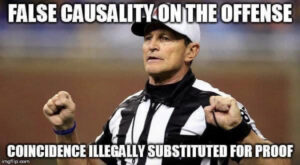 This is based upon the assumption that a real or imagined relationship between things means one is the cause of the other. For example:
This is based upon the assumption that a real or imagined relationship between things means one is the cause of the other. For example:
Pointing to a fancy chart, James shows how volcanic eruptions has been increasing while the number of pirates has been decreasing. He then draws the conclusion that the presence of pirates inhibits eruptions.
Special Pleading Fallacy
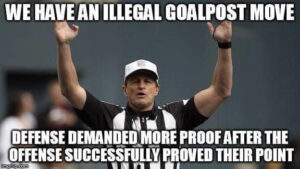 This one usually occurs whenever a person's other logical fallacies have been proven false, so they attempt to move the goalposts to create exceptions where their claim is actually true. One example of this is a person claiming to be a psychic has their abilities proven false/fraudulent under proper scientific conditions, but they respond that for their abilities to work, one must have faith in them/him.
This one usually occurs whenever a person's other logical fallacies have been proven false, so they attempt to move the goalposts to create exceptions where their claim is actually true. One example of this is a person claiming to be a psychic has their abilities proven false/fraudulent under proper scientific conditions, but they respond that for their abilities to work, one must have faith in them/him.
We see this fallacy in action whenever pro-abortion folks trot our their favorite saws about how rape and incest justify baby killing as we saw in Greg Koukl's encounter with the Wiccan clerk.
Ad Populum (The Bandwagon Fallacy)
This is perfectly exemplified in the claim virtually every teenager on the planet as made to their parents at least once in their lives:
But all the other kids are doing/wearing this/going there/whatever!
This is the fallacy underlying the groupthink bias discussed in my previous article in this series.
Composition/Division Fallacy
This is where someone assumes that’s what is true about one aspect of something has to be true or applied to all or other parts of it. Here’s an example:
Dunston was a precocious child and had a liking for logic. He reasoned that atoms are invisible, and that since he was made of atoms, he was invisible, as well. Unfortunately, this reasoning did not serve him well during a game of hide-and-seek.
“No True Scotsman” Fallacy (aka Appeal to Purity)
This fallacy is in play whenever someone makes an appeal to purity as a way to dismiss relevant criticism of or flaws in an argument. We see this exemplified in WoF opponents making statements like, “No one who takes their Bible seriously believes it is God’s will for us to be physically healthy or financially prosperous.”
Genetic Fallacy
This takes place when we judge something as good or bad on the basis of where it comes from or from whom it comes. We see this in the Scriptures where a common prejudice of that day and region was wielded against Jesus in “Can anything good come out of Nazareth?”
We see this evidenced all the time these days when anti-charismatics dismiss any claims opposing their views as “that’s just charismatic doctrine,” or when someone who they love to vilify has said it despite the fact the claim in question is absolutely scriptural.
A prime example is the current mantra mouthed by every Marxist on the news: “If you don’t agree with us, you’re a racist.” Since no one wants to be classified as a racist — unless they truly are one and don’t care about being labelled as such — the typical listener is thereby persuaded to agree with whatever leftist talking-point is being proclaimed. The problem with this situation as it currently stands is the majority of folks listening to such drivel have gotten wiser to the tactic because the so-called progressive crowd doesn’t know when to stop, so such accusations are now akin to the boy who cried “Wolf!”
Another example from the theological realm is a common objection voiced by many opposed to the healing-is-God’s-will message: “What if it doesn’t work? How do I explain to someone’s surviving relatives why they died?”
Their underlying assumption here is that it won’t work, so from that flawed basis, the two implied choices are either: 1) not teaching it, thereby avoiding such “tragedies,” or; 2) teach it, and then have to defend God to a hurting, sometimes hostile, crowd. However, there is a third option never mentioned, if even considered: “What if it does work?”
Circular Logic (aka Begging the Question)
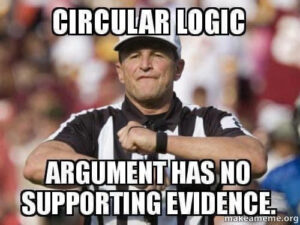 This is an argument in which the conclusion is included in the premise. For example:
This is an argument in which the conclusion is included in the premise. For example:
The words of Muhammed are flawless and perfect and should never be questioned. We know this because it says so in the Qur’an, an infallible book written by Muhammed.
This is an article of faith among Muslims and one of several reasons why Islam is immune to ever having its own version of a Protestant Reformation.
The Texas Sharpshooter Fallacy (aka Cherry Picking)
This is a fallacy where certain statistics or facts supporting a particular narrative are used whereas those countering the narrative are never presented and/or the selected acts are presented with a complete absence of their context. For example:
The makers of Sugar Candy sodas point to research showing that, of the five countries where Sugar Candy drinks sell the most units, three of them are ranked among the top-tend healthiest countries on Earth, therefore Sugar Candy drinks are healthy.
We saw this fallacy demonstrated repeatedly by the prosecution during the Derek Chauvin murder trial for the in-custody death of George Floyd as mentioned in my previous installment in this series.
Anecdotal Evidence (aka Hasty Generalization)
We see this one whenever someone uses a personal experience or isolated example in lieu of a valid argument, especially to dismiss statistics or Scripture. Think of it as the illegitimate offspring of the Cherry Picking and False Dichotomy fallacies.
For one example from modern political discourse, we see valid statistics demonstrating how minorities currently have far more political freedom, greater upward financial/social mobility, political clout, and less overt discrimination in the workplace/society than ever before in American history. The racial discrimination industrial complex responds by cherry-picking instances where persons of color have been treated badly by police, etc. to nullify those statistics (I’m not claiming such accounts are false — tragically, many indeed are — but such accounts cannot and do not negate the statistical data). Then the False Dichotomy fallacy part of the equation kicks into action by declaring both the statistics and these cherry-picked accounts cannot coexist in reality when in fact they actually do.
In the Christian world, one common use of this fallacy is the following claim:
Aunt Bucketmouth stood in faith for her healing and died anyway, so divine healing is heresy.
First, any claim of heresy concerning divine healing is fraudulent on its face because no one teaching it has laid claim to it being a condition for salvation. Healing is a peripheral doctrine, therefore it could never rise to the level of heresy, even if it was wrong (which it isn’t!).
Second, someone dying while ostensibly believing any valid Christian doctrine does not negate its inherent truth. We — as well as the person committing this fallacy! — simply do not and cannot know the heart and mind of that beloved aunt. That specific ability is unique to one Person in the universe and we ain’t Him! All we can do is speculate and even that is forbidden by divine command:
Judge not, that you be not judged. For with what judgment you judge, you will be judged; and with the measure you use, it will be measured back to you. Matthew 7:1-2
This command applies to all believers, no matter which side of this debate we may take. It is just as much a sin to proclaim from the cheap seats a particular person “didn’t have enough faith” as it is to categorically state that selfsame person had all the faith in the world.
All we can conclude in such cases is this: this happened for reasons unknown to us this side of eternity, period.
Quoting Out of Context Fallacy
This, too, is a variant of the Cherry Picking fallacy, but this one deals with citing someone’s speech and/or writings out of their context, rather than selecting convenient statistics.
We saw it in abundance whenever the leftist media was dealing with anything uttered by President Trump.
This fallacy is also evidenced in just about every discussion concerning the Bible and Christianity taking place today where atheists pick and choose passages and present them bereft of context as prima facie evidence for their claims.
Tragically, quoting Scripture out of context is even more prevalent inside the Church. We see this demonstrated whenever someone’s pet doctrines are threatened or refuted, so they commit hermeneutical violence on the Scriptures to support their positions.
The old saw of “you can use the Bible to prove anything” is only true when you remove verses/passages from their context. I’ve covered how to properly establish context when interpreting Scripture in a previous article here at Miscellaneous Ramblings, so I will refrain from reinventing that wheel here.
Middle Ground Fallacy
This one is in play whenever we see someone offer a compromise between two polar-opposite positions. Handling this is tricky because we have to first discern whether a False Dichotomy fallacy is already in progress which could have been used to establish the two extremes in the first place.
That is not to say compromise is never appropriate; there are many cases where it absolutely is so. But morality, among other issues, is not one of them. In the example we’ve already discussed concerning abortion, the Special Pleading fallacy is used to create a middle ground compromise where killing babies under the circumstances of rape or incest is proclaimed as justifiable. While such situations are indeed tragic (I personally know more than a few men and women alike who have been raped and/or molested by family members), those reprehensible events still do not justify an additional reprehensible event of killing an innocent baby produced by them.
Another place where we see this fallacy in play is when the validity of other world religions is under discussion and the tired old “all religions lead to God” trope is proclaimed, as if that is some kind of middle ground where Christ-followers can agree to play nice with Hindus, Buddhists, and Moslems. That sort of ecumenical claptrap was removed from the realm of possibility when Jesus proclaimed Himself to be God-in-Sandals:
Jesus said to him, “ I am the way, the truth, and the life. No one comes to the Father except through Me. If you had known Me, you would have known My Father also; and from now on you know Him and have seen Him.”
Philip said to Him, “Lord, show us the Father, and it is sufficient for us.”
Jesus said to him, “Have I been with you so long, and yet you have not known Me, Philip? He who has seen Me has seen the Father ; so how can you say, ‘Show us the Father?'”
John 14:6-9
In no way am I justifying discrimination against or persecution of other religions by Christians; we are commanded by none other than our Master Himself to love them as He loves us. But proclaiming they are equally valid approaches to God is totally bogus on its face.
Tu Quoque
This fallacy takes place whenever a criticism is answered with a counter-criticism. This is done to shift the focus of blameworthiness back onto the original accuser. Here is an example of tu quoque in action:
Parent: Using illegal drugs is both morally wrong and illegal.
Teen: You drink booze. What’s the difference?
Sunk-Cost Fallacy
We see this one in play whenever we witness activists refusing to consider the validity of an opposing view because they have invested so much of their time, energy, passion, and/or money in support of the false narrative they have espoused, oftentimes for years, even decades.
It takes a huge amount of emotional honesty, humility, and courage to publicly admit you have been tragically wrong for such a long time. Some have it, most don’t and would rather die wrong than admit it because they have fought so hard for their cause for so long it has become their very identity.
The Big Lie
This is a propaganda technique defying categorization as a cognitive bias or logical fallacy, but it incorporates one or more logical fallacies and definitely attempts to play on a listener’s biases. The Big Lie is simply that: a completely false narrative which is trumpeted over and over and over and over again from politicians and the media alike to build support for their agenda(s). Hitler’s propaganda falsely attributing Germany’s pre-WWII economic and societal woes to the Jews is a prime example of the Big Lie in action and we see where that led: the Holocaust. So this is an extremely dangerous propaganda tool and tragically, we see examples of it on an hourly basis these days.
The Big Lies we see currently in play as of this writing are, but not limited to:
- Conservatives and/or Christians are racists and white supremacists.
- Capitalism and capitalists are evil, so a Marxist government in the US is the only solution to our societal problems.
- Christians are narrow-minded superstitious judgmental bigots who hate all those who disagree with them, especially on the topic of sex (tragically, they can actually make something of a case for this based upon Christendom’s social media behavior).
- Opposing views to the leftist narrative are hate-speech and should be suppressed.
- God wants us to be sick and poor so He can teach us humility/patience/etc.
- Charismatic and WoF believers are heretics.
Here’s a tip for you: with very few exceptions, we can instantly detect when a Democrat politician — as well as more than a few Republicans — are lying to us: their lips are moving! Sorry for the overt cynicism, but that has been my observation of US politics for over 4 decades and it is getting exponentially worse, rather than better, by the day as we rapidly approach the day of Christ’s return.
Conclusion
I hope and pray what I have been sharing has been valuable to you. I have diligently tried to translate a topic chock-full of philosophical jargon into something any man or woman on the street can grasp.
 I've provided all of this so you have a BS-O-Meter you can use to navigate the dual minefields of political and theological debate out there.
I've provided all of this so you have a BS-O-Meter you can use to navigate the dual minefields of political and theological debate out there.
The first person I invite you to use that meter on is me.
Nothing I say in this series or anywhere else here at Miscellaneous Ramblings is immune to your scrutiny and analysis using the very precepts presented in this series. I am always open to you respectfully calling me out if/when you feel I have strayed from a clear-cut presentation and analysis of the facts, letting the chips fall where they may. You are welcome to express any such remarks in the comments section below each blog post.
My next article in this series details my interaction with an atheist where I got to apply all of the principles presented in this and the previous two articles.
Thanks for reading!
What are Cognitive Biases?
